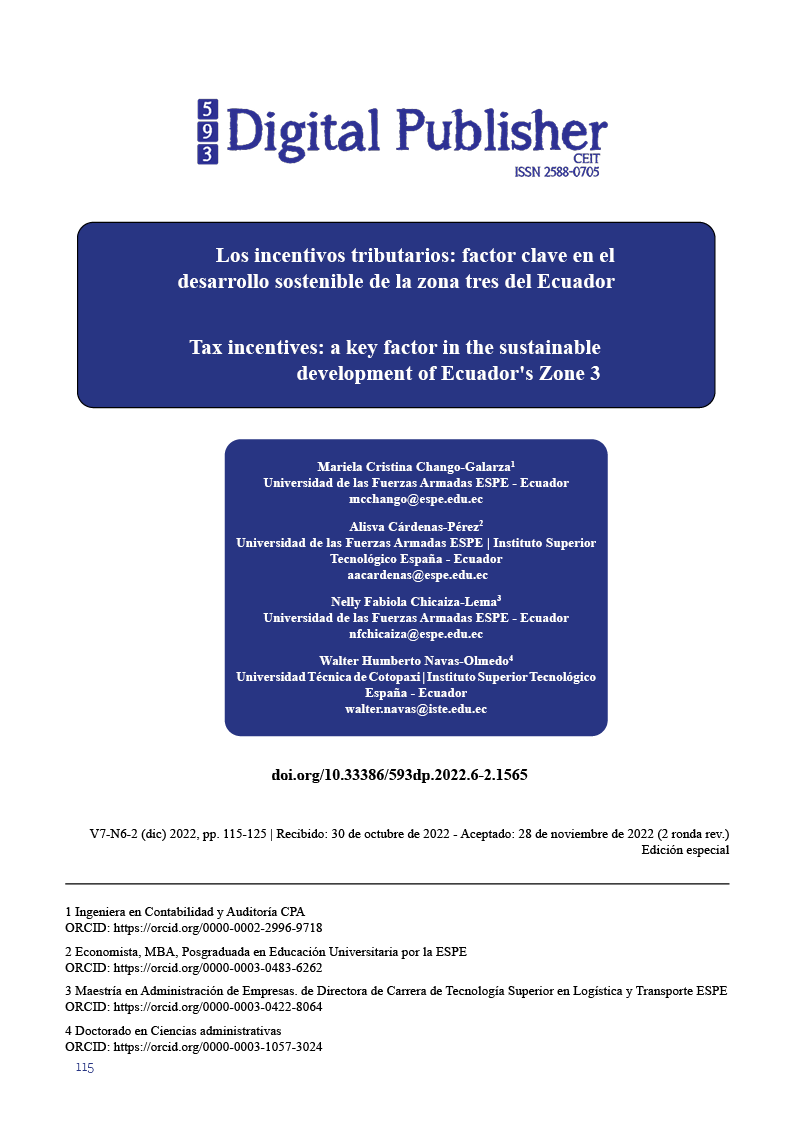Tax Incentives are a key factor in the sustainable development of Zone Three of Ecuador
Main Article Content
Abstract
The main objective of this research is to carry out an analysis of tax incentives in the development of companies that make up zone three of Ecuador in recent years, it is important to emphasize that this work is the product of the need that taxpayers have in each one. of the prioritized sectors, in order to contribute to the economic development of the Country taking tax incentives as a reference, this time the agricultural sector that generates a great contribution to zonal development will be analyzed, it is intended to contribute to the sustainability of the agricultural sector, this was achieved through documentary and field bibliographic research through the implementation of information collection methods called surveys. The information collection method allowed establishing the lack of skills in the sector, contributing to the little application of incentives and care for the environment, by not being used efficiently, due to ignorance, lack of training in tax reforms and scarcity dissemination by regulatory bodies. Consequently, the different organizations have focused on resorting to other types of strategies, leaving aside sustainability and taxation as a transversal axis for their economic and social development.
Downloads
Article Details

This work is licensed under a Creative Commons Attribution-NonCommercial-ShareAlike 4.0 International License.
1. Derechos de autor
Las obras que se publican en 593 Digital Publisher CEIT están sujetas a los siguientes términos:
1.1. 593 Digital Publisher CEIT, conserva los derechos patrimoniales (copyright) de las obras publicadas, favorece y permite la reutilización de las mismas bajo la licencia Licencia Creative Commons 4.0 de Reconocimiento-NoComercial-CompartirIgual 4.0, por lo cual se pueden copiar, usar, difundir, transmitir y exponer públicamente, siempre que:
1.1.a. Se cite la autoría y fuente original de su publicación (revista, editorial, URL).
1.1.b. No se usen para fines comerciales u onerosos.
1.1.c. Se mencione la existencia y especificaciones de esta licencia de uso.
References
Barzallo et al. (2018). El Incentivo Drawback en Empresas Florícolas de la Provincia del Azuay: Un FODA a través del método Delphi. 6(7), 39. https://www.theibfr.com/download/rgn/2018_rgn/rgn-v6n7-2018/RGN-V6N7-2018-4.pdf
Cuadrado-Avilés, D., Masapanta-Alomoto, D., & Cárdenas-Pérez, A. (2022). Análisis de un sistema de Contabilidad de Costos y su incidencia en la rentabilidad de los negocios artesanales de la parroquia La Victoria, cantón Pujilí, provincia de Cotopaxi durante el período 2019 - 2021. Revista Publicando, 9(35), 33-49. https://doi.org/10.51528/rp.vol9.id2337
Cepal, (2019). Los incentivos fiscales a las empresas en América Latina y el Caribe, Documentos de Proyectos (LC/TS.2019/50), Santiago.
FAO, (2017). Seguridad alimentaria y nutricional en América Latina y el Caribe. Obtenido de https://www.fao.org/americas/prioridades/seguridad-alimentaria/es/
García, C., Sepúlveda, C., Gómez, M. y Ibrahim, M. (2018). Identificación, priorización y análisis costo-beneficio de buenas prácticas ganaderas que los productores de fincas estratificadas implementan para reducir los efectos de la variabilidad climática en el municipio de Olanchito, Yoro, Honduras. Vol. 7, pp. 71-97; Ed. UNICAES editores
Hernández, R., Fernández, C. y Baptista, M. (2014) Metodología de la Investigación (Sexta Edición). McGRAW-HILL.
Logroño, M; Yumisaca, E; López, W; Flores, P. (2020) Contextualización de la agricultura y el patrimonio a miras de identificar y caracterizar productos de interés patrimonial. VI Congreso Internacional Secti 2019.
Luque, G., Moreno, K. & Lanchipa, T. (2021). Impactos del COVID-19 en la agricultura y la seguridad alimentaria. Centro Agrícola, Vol. 48(1), 72-82.
MAGAP, (2016). La política Agropecuaria Ecuatoriana. Hacia el desarrollo territorial rural sostenible 2015 -2025 II Parte. ISBN: 978-9942-22-019-6. Quito - Ecuador.
MAGAP, (2020). Resumen Ejecutivo de los Diagnósticos Territoriales del Sector Agrario. Ministerio de Agricultura y Ganadería.
Martínez, M. (2016). Modelado de estrategias de labranza agrícola mecanizada para diversos cultivos mediante un algoritmo informático de toma de decisiones. Producción Agropecuaria y Desarrollo Sostenible. Vol. 5, pp. 61-76; Ed. UNICAES editores
Martínez, R., Tuya, L., Martínez, M., Pérez, A. & Cánovas, A. (2009). El Coeficiente de correlaciones de los rangos de Spearman caracterización. Revista Habanera de Ciencias Médicas, 8(2)
ONU-REDD, (2015). Incentivos fiscales a la producción agrícola: opciones para forjar una compatibilidad con REDD+, Programa ONU-REDD, Boletín de Políticas.
Patiño-Pilliza, K., Fonseca-León, C., & Chango-Galarza, M. (2022). Control de costos de producción bajo la Norma ISO 9001: 2015: Una opción a la minimización del desperdicio económico en los negocios artesanales de la parroquia La Victoria, cantón Pujilí, provincia de Cotopaxi, periodo 2019-2021. Revista Publicando, 9 (35), 19-32. https://doi.org/10.51528/rp.vol9.id2336
Plan Provincial de Riego de Tungurahua, (2014). Dirección de Recursos Hídricos y Gestión Ambiental. Honorable Gobierno Provincial de Tungurahua.
Porles, J., Cachay, O. & Salas, G., (2015). ¿Qué requerimos para una industrialización sostenible del Perú? Una propuesta del modelo industrial. Industrial Data. Vol. 18, pp 89-98. Universidad Nacional Mayor de San Marcos. Lima, Perú.
Quiroga, R. (2001). Indicadores de sostenibilidad ambiental: estado de arte y perspectivas. Serie manuales, 9. https://repositorio.cepal.org/bitstream/handle/11362/5570/S0110817es.pdf?sequence=1
Riveros, H & Gámez J. (2014). Desarrollo de los Agronegocios en América Latina y el Caribe, Conceptos, Instrumentos, Proyectos de Cooperación Técnica. Tendencias de los mercados agroalimentarios, diferenciación por segmentos y principales actores. Instituto Interamericano de Cooperación para la Agricultura. ISBN: 978-92-9248-511-5.
Rojas, J. & Vaca J. (2022). Incentivos tributarios y su incidencia en el desarrollo sostenible de las empresas agrícolas de la zona 3, periodo 2019 – 2020. http://repositorio.espe.edu.ec/handle/21000/30502.
Romero, M. (2016). Pruebas de bondad de ajuste a una distribución normal. Revista Enfermería del Trabajo, 6:3. pp. 105-114.
Tapia, C., & Cevallos, K. (2022). Pruebas para comprobar la normalidad de datos en procesos productivos: Anderson-Darling, Ryan-Joiner, Shapiro-Wilk y Kolmogórov-Smornov. Societas. Revista De Ciencias Sociales Y Humanísticas, 23(2), 83-106.





